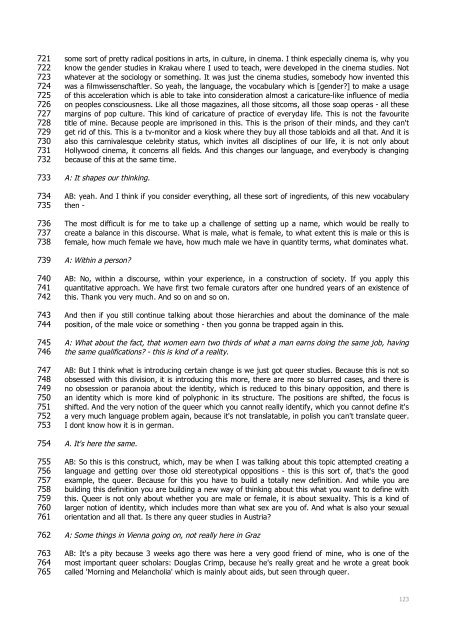Dekonstruktion von Zweigeschlechtlichkeit - anita.a.mörth
Dekonstruktion von Zweigeschlechtlichkeit - anita.a.mörth
Dekonstruktion von Zweigeschlechtlichkeit - anita.a.mörth
Sie wollen auch ein ePaper? Erhöhen Sie die Reichweite Ihrer Titel.
YUMPU macht aus Druck-PDFs automatisch weboptimierte ePaper, die Google liebt.
721<br />
722<br />
723<br />
724<br />
725<br />
726<br />
727<br />
728<br />
729<br />
730<br />
731<br />
732<br />
733<br />
734<br />
735<br />
736<br />
737<br />
738<br />
739<br />
740<br />
741<br />
742<br />
743<br />
744<br />
745<br />
746<br />
747<br />
748<br />
749<br />
750<br />
751<br />
752<br />
753<br />
754<br />
755<br />
756<br />
757<br />
758<br />
759<br />
760<br />
761<br />
762<br />
763<br />
764<br />
765<br />
some sort of pretty radical positions in arts, in culture, in cinema. I think especially cinema is, why you<br />
know the gender studies in Krakau where I used to teach, were developed in the cinema studies. Not<br />
whatever at the sociology or something. It was just the cinema studies, somebody how invented this<br />
was a filmwissenschaftler. So yeah, the language, the vocabulary which is [gender?] to make a usage<br />
of this acceleration which is able to take into consideration almost a caricature-like influence of media<br />
on peoples consciousness. Like all those magazines, all those sitcoms, all those soap operas - all these<br />
margins of pop culture. This kind of caricature of practice of everyday life. This is not the favourite<br />
title of mine. Because people are imprisoned in this. This is the prison of their minds, and they can't<br />
get rid of this. This is a tv-monitor and a kiosk where they buy all those tabloids and all that. And it is<br />
also this carnivalesque celebrity status, which invites all disciplines of our life, it is not only about<br />
Hollywood cinema, it concerns all fields. And this changes our language, and everybody is changing<br />
because of this at the same time.<br />
A: It shapes our thinking.<br />
AB: yeah. And I think if you consider everything, all these sort of ingredients, of this new vocabulary<br />
then -<br />
The most difficult is for me to take up a challenge of setting up a name, which would be really to<br />
create a balance in this discourse. What is male, what is female, to what extent this is male or this is<br />
female, how much female we have, how much male we have in quantity terms, what dominates what.<br />
A: Within a person?<br />
AB: No, within a discourse, within your experience, in a construction of society. If you apply this<br />
quantitative approach. We have first two female curators after one hundred years of an existence of<br />
this. Thank you very much. And so on and so on.<br />
And then if you still continue talking about those hierarchies and about the dominance of the male<br />
position, of the male voice or something - then you gonna be trapped again in this.<br />
A: What about the fact, that women earn two thirds of what a man earns doing the same job, having<br />
the same qualifications? - this is kind of a reality.<br />
AB: But I think what is introducing certain change is we just got queer studies. Because this is not so<br />
obsessed with this division, it is introducing this more, there are more so blurred cases, and there is<br />
no obsession or paranoia about the identity, which is reduced to this binary opposition, and there is<br />
an identity which is more kind of polyphonic in its structure. The positions are shifted, the focus is<br />
shifted. And the very notion of the queer which you cannot really identify, which you cannot define it's<br />
a very much language problem again, because it's not translatable, in polish you can't translate queer.<br />
I dont know how it is in german.<br />
A. It's here the same.<br />
AB: So this is this construct, which, may be when I was talking about this topic attempted creating a<br />
language and getting over those old stereotypical oppositions - this is this sort of, that's the good<br />
example, the queer. Because for this you have to build a totally new definition. And while you are<br />
building this definition you are building a new way of thinking about this what you want to define with<br />
this. Queer is not only about whether you are male or female, it is about sexuality. This is a kind of<br />
larger notion of identity, which includes more than what sex are you of. And what is also your sexual<br />
orientation and all that. Is there any queer studies in Austria?<br />
A: Some things in Vienna going on, not really here in Graz<br />
AB: It's a pity because 3 weeks ago there was here a very good friend of mine, who is one of the<br />
most important queer scholars: Douglas Crimp, because he's really great and he wrote a great book<br />
called 'Morning and Melancholia' which is mainly about aids, but seen through queer.<br />
123


